What Accessibility Means to Me
Hey! Just so you know, this article is over 2 years old. Some of the information in it might be outdated, so take it with a grain of salt. I'm not saying it's not worth a read, but don't take everything in it as gospel. If you're curious about something, it never hurts to double-check with a more up-to-date source!
Before I go into what accessibility means to me, I first want to tell you a story of how I began to start going blind.
In September of 2018, I had just graduated with my undergraduate degree in Website Design and Development. I was working as a freelancer from my university dorm room with space for another contractor to join me. Juggling the start of a masters degree with the hope to launch and grow an independent business, nothing could stop me on my road to success.
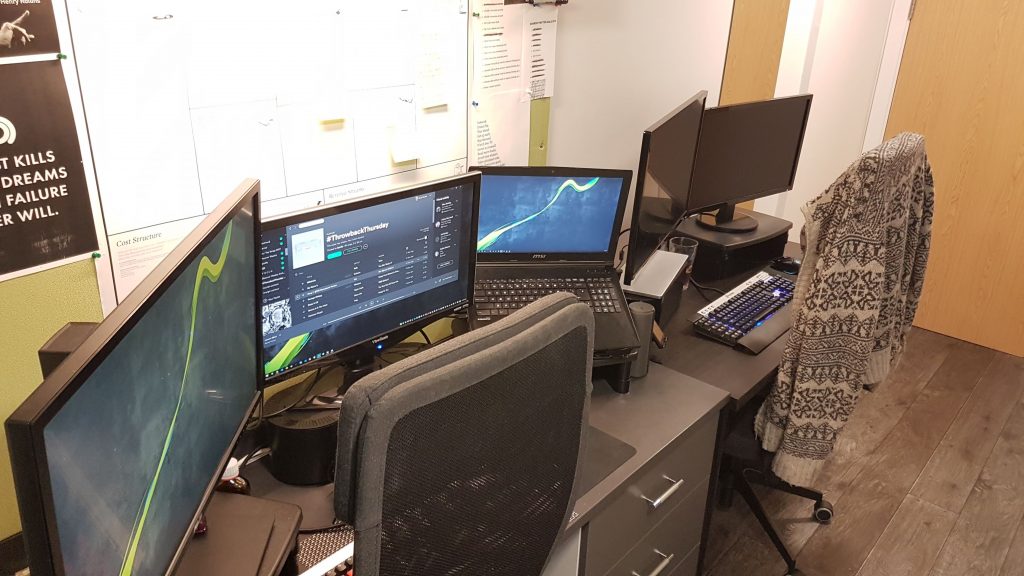
My dormroom in 2018, two desks
At the time I was a business hungry, aspirational developer, with dreams of starting my own business. We all know the cliche, a young person with big hopes for the world and a touch of blissful ignorance that they are the exception that will take on the world and become successful.
It was one day in September, I was working like any other day. Lost in the chaotic nature of answering emails, developing websites, and managing projects, when my dreams came to a crashing halt.
Suddenly my vision started to become blurry.
I had put it down to some external circumstances. Maybe I'd had way too much coffee? Not having enough sleep? Been working out with too heavy of weights?
I gave it a day to see if it would return to normal.
At the end of the day it was still an issue but I was sure that when I would wake up the next day that I would be back to my usual vision.
That wasn't the case, the next day I woke up with worse vision than the day before.
I was starting to go blind.
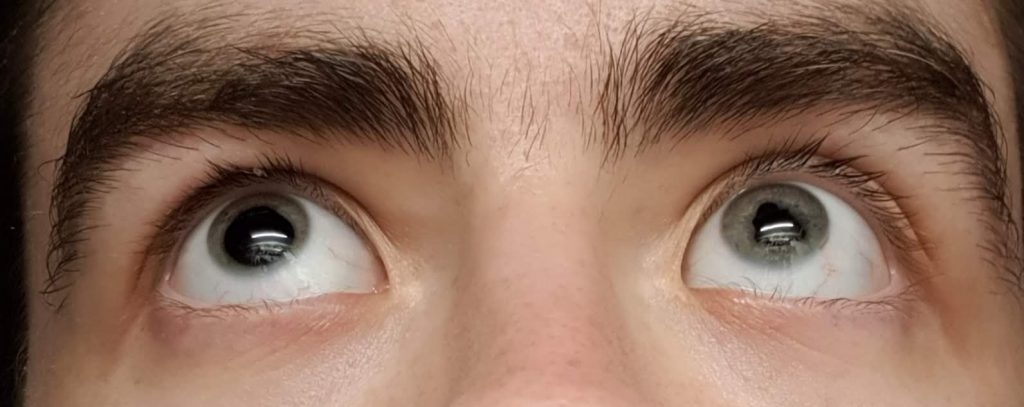
Diagnoses
#Starting to panic a bit, I had my partner at the time drive me to eye casualty at Southampton General Hospital. When I arrived it was filled with elderly patients, I stood out like a lemon in a box of apples.
After spending 6 hours in eye casualty, working my way up from triage to seeing a nurse, to eventually speaking with the eye consultants. I was eventually seen and told that I was suffering from a condition called Uveitis.
Uveitis, if not treated immediately with an injection to the eye (sorry if you're squeamish) would guarantee that my vision would continue to get worse. At best the injection would cure the possibly acute flare-up, and at worst I would have a story to remember.
To cut a long story short, I had the injection and all I got was the story. It didn't work.
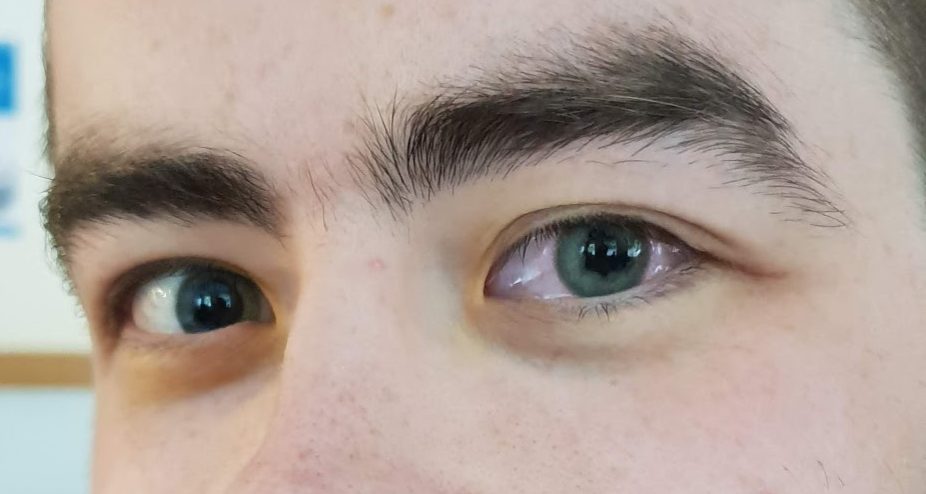
Me, 15 minutes after the injection. You can see my right pupil is filling my eye and the left pupil isn't a perfect circle, instead a misshapen blob.
I've been on medication since that day, taking everything from steroids to autoimmune suppressants, and I've been on a range of different eye drops.
My daily drug intake fluctuates but at minimum, I have to take 10 pills a day at specific times. Compared to the highest count of 22 pills a day, I'm grateful to be at such a low number. It's all relative right?
I've also learnt of existing, or developed new conditions during my treatment. Including -
- Sarcoidosis (Autoimmune condition, impacts my chest & lungs)
- Glaucoma
- Cataracts in both of my eyes (at the age of 24) - I had double eye surgery on both of my eyes at 25, during the COVID pandemic.
Accessibility and Life
#Since developing my conditions, technology has enabled me to live in more accomodating ways than I can even begin to list, but there is one stand out experience. Being able to read everyday words.
In 2020 I developed a severe case of cataracts in both of my eyes.
One of the largest symptoms of cataracts is the development of blurry vision. I can only compare it to someone blowing dandelions into your eyes without being able to remove the light, fluffy, white seeds from your eyes.

As a result, I couldn't read anything.
I was unable to read anything on my computer.
Letters that came in the post were impossible to read.
Over time, things I took for granted like being able to read a sign or a licence plate were things that I thought I would never be able to do again.
Black text just faded under the puffy cloud of white backgrounds everywhere.
There was, however, one rather odd exception. I found that I could read better when the text was white and the background was dark. After finding this out, I started looking at ways I could invert the black and white around me.
First off, I wanted to invert the web, I did this with a plugin called Dark Reader
With the plugin installed, not only do you get to feel like an ominous hacker turning your everyday websites to a dark theme, but for those with cataracts, you can actually read again.
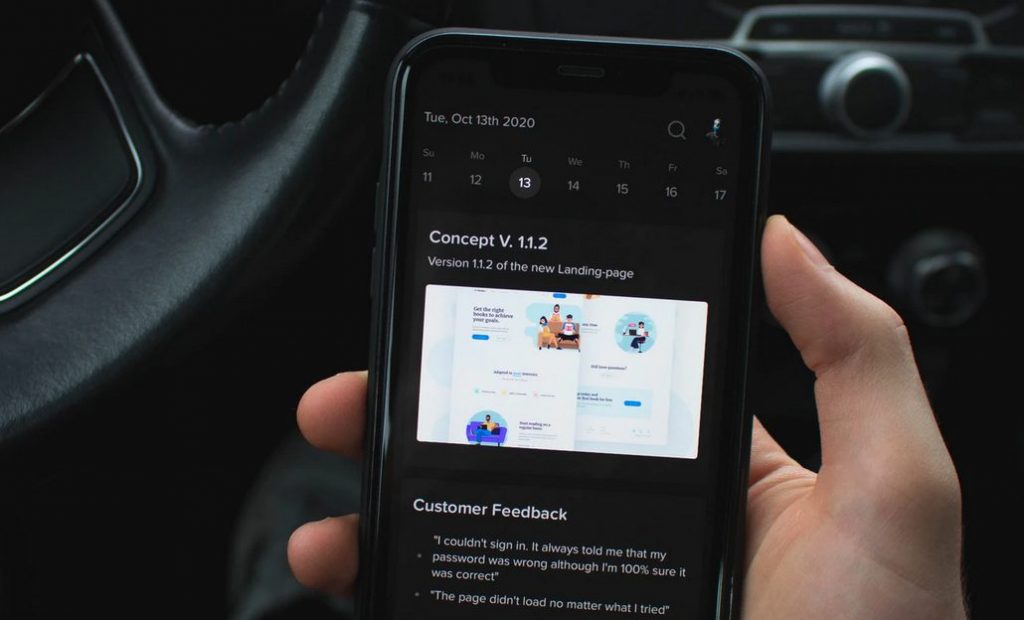
Yes, you heard me correctly. Dark mode meant that I could see again. It may not have been crystal clear vision but it was the only time I could read anything.
Soon, I was learning how to take images of my post with my mobile phone, upload them to my computer and then invert the white paper to be black, with white ink as the text.
Manipulating what the everyday interfaces were with the power of technology. Being able to zoom in on small text with the tools provided by my mobile phone and computer operating system. Having large articles read aloud to me with screen reader assisted tools. All these methods allowed me to see again.
How Accessibility Helps Everyone
#So I can imagine you're thinking to yourself -
Jack, that's a heartwarming story, but I'm not going blind and most of my customers are healthy so it doesn't really mean much to me.
It's a very common misconception that building an inclusive and accessible experience is only beneficial to those with physical disabilities.
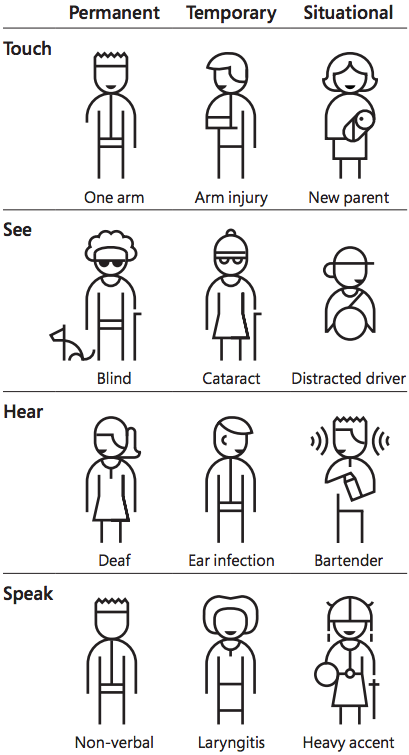
Source: iweb.co.uk
The truth is that developing accessible experiences can help everyone. All of us, at one time or another endures a situation which either hightens existing or increases the number of challenges we experience in completing a task.
To help illustrate these situations, iWeb has developed a lovely illustration above which shows three primary categories a disability can be grouped as. The three categories are -
- Temporary
- Permanent
- Situational
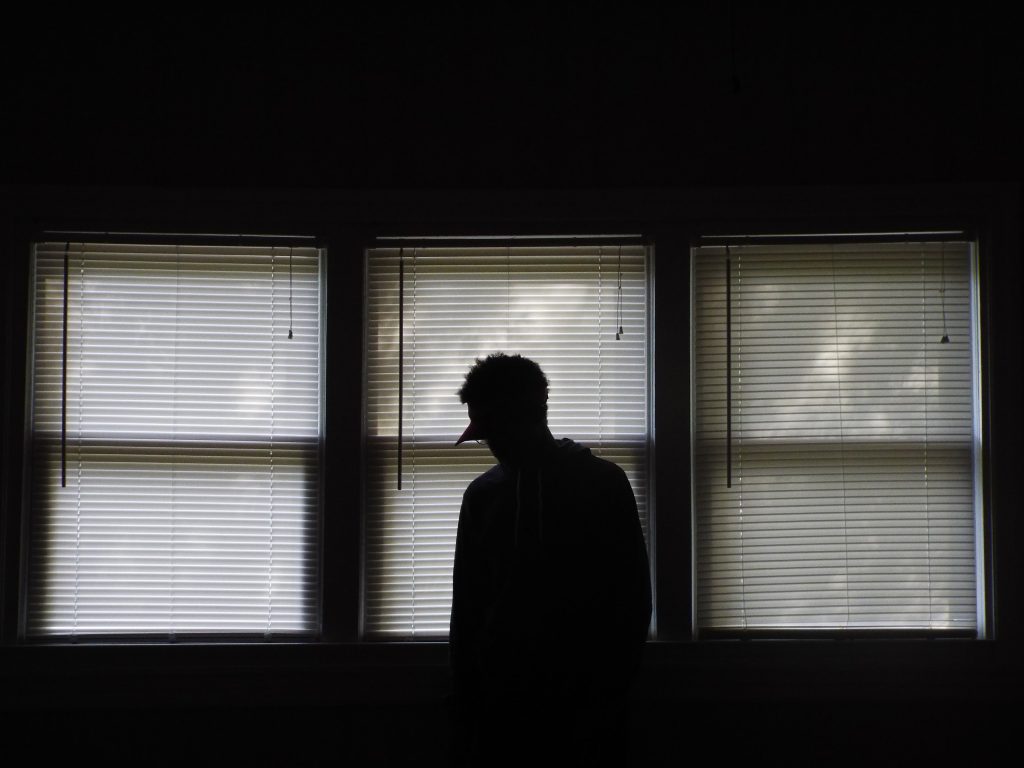
Permanent
#A permanent experience could be blindness.
For the sake of this example, I will use the most literal definition of blindness that people think of when they read the term (there are actually varying levels). Being unable to see anything is the term most people associate with the condition.
Not being able to read, let alone see is clearly a disadvantage in any given situation.
Imagine walking to the shops and buying your food shop, it's something we take for granted, but for a person who is blind, this is a difficult task that presents many challenges.
For a start, not bumping into another person is one challenge, but imagine how difficult it is to find a lane with the item you want, let alone the specific brand of the item you want to buy in the store, amongst tens of thousands of products. Similar packaging, weight, and you can't exactly decipher the products from braille with most packaging.

Now let's rethink this experience with digital.
That same person when using a well developed website or mobile application can navigate through a website where products are clearly categorised by department, or better yet they can use the search bar to look up a specific brand and product and add it to their cart immediately.
Blind people (both literal and general term) can benefit from tool assisted technology called screen readers which will scan a websites' text and read it aloud for them to understand the context of a page or section of a page.
Technology, more specifically websites and screen readers not only provide a better experience but also empower the disabled to remove negative user experiences in favour of one that allows them to achieve their goals in a given task.
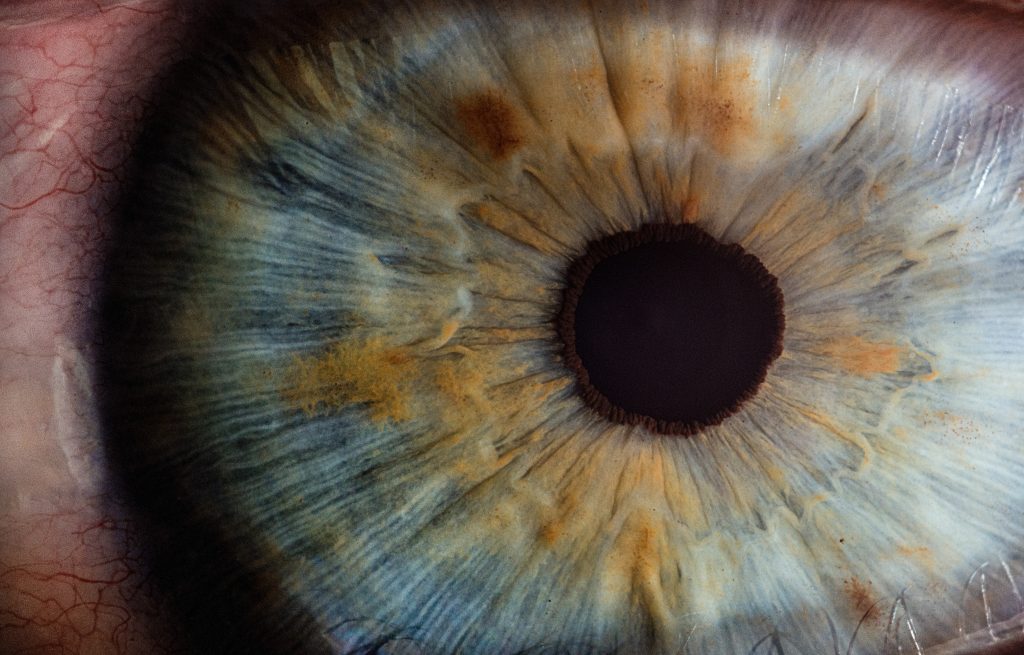
Temporary
#Cataracts, a condition that just about everyone will have to face at some point in their lives. By age 75, 50% of the USA have cataracts. By age 80, 70% of the population has the condition in at least one eye.
When you reach about the age range of 75-80, you are almost guaranteed to share the same experience I had. Not being able to read most websites, and physical letters will be an impossible task.
It's not a matter of if, but rather when.
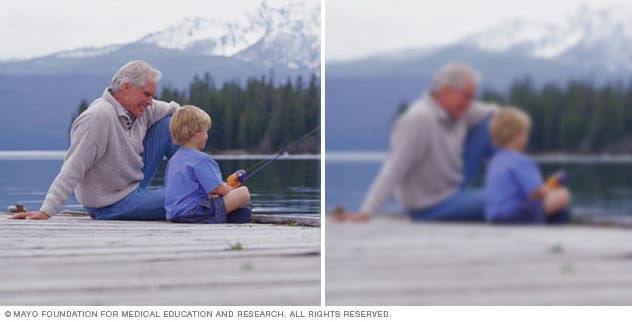
Image Source: mayoclinic.org
Fortunately, cataracts are treatable. Doctors will offer to operate on your eyes and place plastic lenses as a replacement for your cataract ridden lenses. While it may sound like a scary experience, it's a welcome alternative to going blind.
The only time cataracts will bother you is the time between the condition begins developing and the time of your surgery. I say this because post-surgery you will return to your vision before the condition. While the time suffering from the condition is a couple of months (less if you go private), it is still crushing and disheartening.
Developing websites or software which supports dark mode, a novelty feature for most sites, will actually enable those with cataracts to use your product.
Not only is this a positive experience, and an obvious ethical choice for businesses, it also increases your sales. By empowering all of your customers, and not leaving anyone behind, you will increase your sales.

Situational
#If you're lucky enough not to suffer from either temporary or permanent disabilities, then I can guarantee that you can benefit from the aid in situational experiences. Almost everyone in the world has experienced an instance where accessibility methods will have benefited you in completing your objectives.
A great example of a situational experience where digital can assist you is that of a new parent. Imagine a new parent, their baby has been crying for a few minutes in their arms. Looking for help, they reach for their phone.
A baby in one arm, and their phone in the other hand, they go to call the grandparents so they can give some sound advice on what best to do. Fortunately it's fairly straightforward to call someone using one hand to turn on a device. Using biometrics or facial detection to unlock the phone without swiping a passcode or tapping the PIN password.
Swipping through their apps they make it to the contacts application and swipe to call their parents. No obstructions to slow them down and now they can calm their anxiety with advice from someone with experience.
Any well developed mobile phone operating system will have been designed for motor impairment and for those in situations similar to the single parent. Allowing users to better control their device, and achieve their goal using the tool with one hand.
If an application or website needs both of your hands to be used at once or has positioned elements in an obtrusive way on a mobile device, it becomes difficult for those with situational disabilities.
At best the poor choices will slow down those without disabilities.
Again, with everyone in mind, the inclusive design patterns will improve the overall experience for every user, not just those with disabilities. Improve the experience, create a better product for all, it'll not only increase your wider-reaching audience but improve the experience of your existing customers.
Wrapping Up
#I touched on some heavy topics at the start of this article. I did this to illustrate how disabilities aren't always consistent. They can come crashing down into your life at any time, anywhere, unexpectedly.
Sometimes disabilities can be temporary and sometimes permanent.
At the time of writing this, my health is better. Not back to normal, it never will be according to my doctors. I am at a level of health where I can return to work and not constantly be impacted by my vision.
I will have uveitis for roughly another decade, maybe more, maybe less. My sarcoidosis (chest condition) is with me for life and can cause other autoimmune conditions.
My cataracts, however, have been removed and I can now see distance without my glasses. My vision is nowhere near as bad it was in 2020, and I am grateful every day to wake with a vision that isn't comparable to that of cataracts.
Most people with disabilities aren't given this same affordance of curable disabilities by life. I've walked in the shoes of those with lowered vision, I understand the frustration a poorly designed product can cause. The alienation of the few because "it's too difficult to build something for everyone". When all they ask for is developers to follow basic and modern development practices.
That's why accessibility means more to me than just a “nice to have”.
It's essential, for those young and old, situational and permanent; people all over the world need digital products to support their individual needs where possible. As accessible, digital products provide an alternative to the frustrating challenges the world presents to them; by giving them an experience where they are empowered to live life as close as possible to the rest of the world and feel normal.